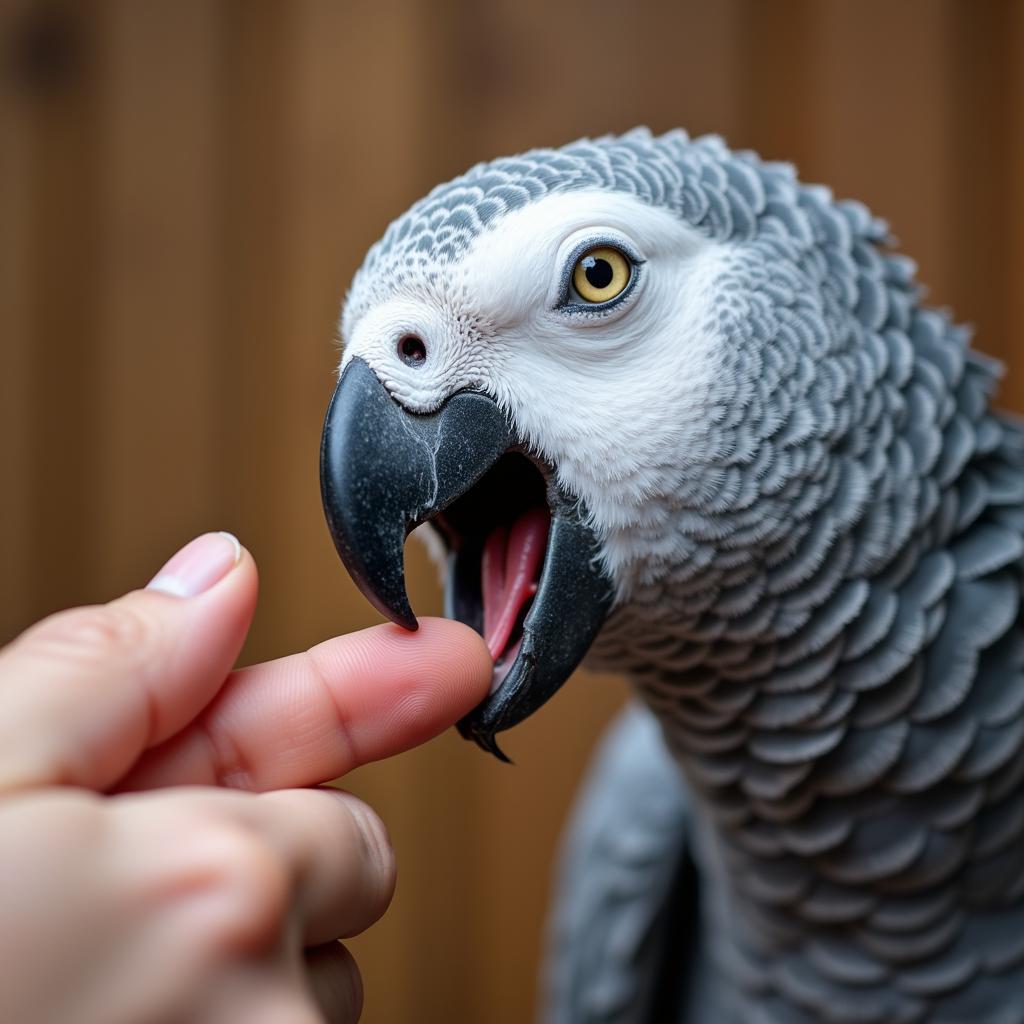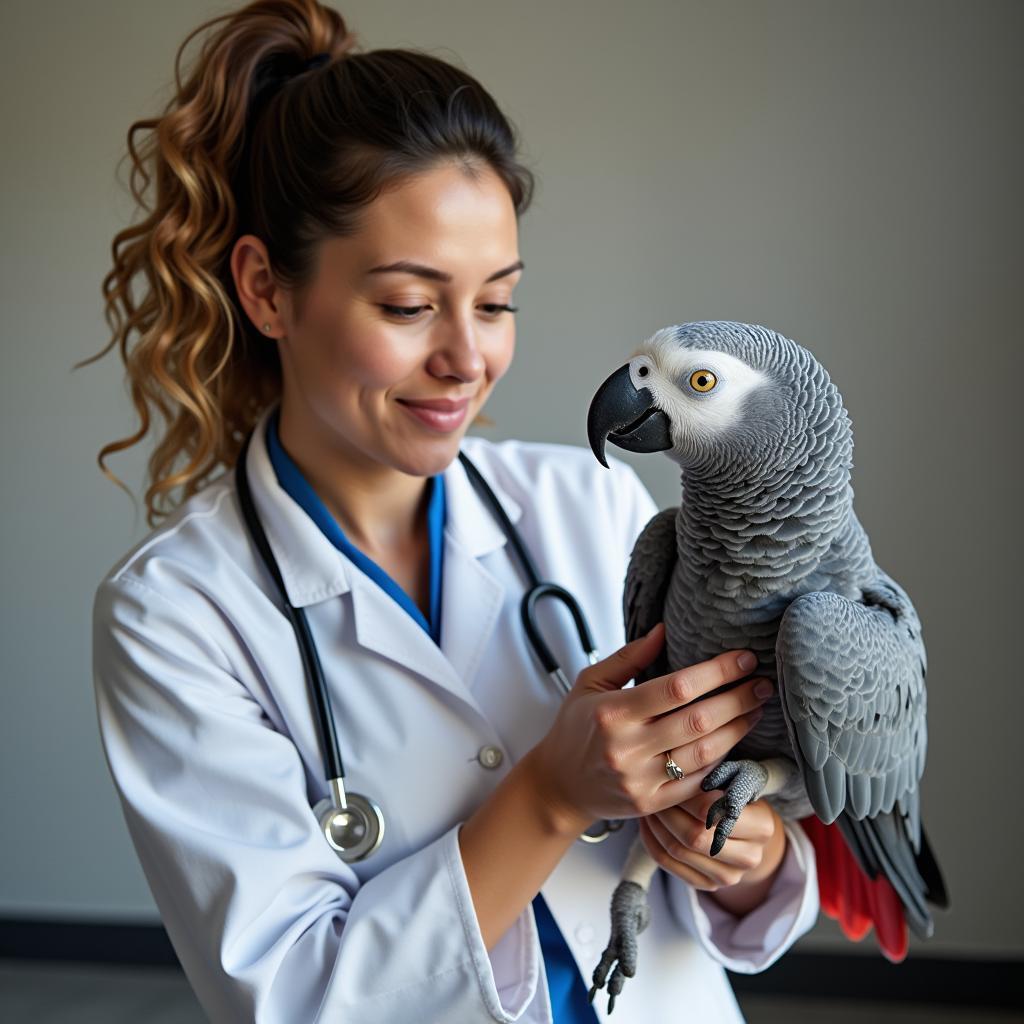Why is My African Grey Biting Me? Understanding and Addressing the Behavior
African grey parrots are renowned for their intelligence, ability to mimic human speech, and their status as cherished companions. However, these intelligent birds can sometimes exhibit behaviors that puzzle and frustrate their owners, with biting being a common concern. If you’re finding yourself asking, “Why is my African Grey Biting Me?”, it’s essential to understand that biting is rarely a random act of aggression. It’s usually a complex form of communication, a way for your bird to express an underlying need, fear, or discomfort.
 African grey parrot biting a finger
African grey parrot biting a finger
Decoding the Bite: Common Reasons for African Grey Biting
To effectively address your African grey’s biting behavior, it’s crucial to identify the root cause. Here are some common reasons why your feathered friend might resort to biting:
-
Fear or Anxiety: Just like any prey animal, African greys can experience fear and anxiety. A new environment, unfamiliar people, loud noises, or even sudden movements can trigger a defensive bite.
-
Territorial Instincts: African greys can be territorial, especially when it comes to their cage, toys, or even a particular person they’ve bonded with. They might bite to protect their perceived territory.
-
Hormonal Changes: During adolescence and breeding seasons, hormonal fluctuations can lead to increased aggression and biting.
-
Lack of Socialization: African greys are highly social creatures. If they haven’t been properly socialized from a young age, they might bite out of fear or insecurity around strangers.
-
Medical Reasons: Underlying medical conditions, such as feather plucking, nutritional deficiencies, or pain, can manifest as behavioral changes, including biting.
-
Seeking Attention: As intelligent and attention-seeking creatures, African greys might resort to biting as a way to get their owner’s attention, even if it’s negative attention.
Addressing the Behavior: Tips for Stopping an African Grey from Biting
Once you’ve identified the potential triggers behind your African grey’s biting, you can start implementing strategies to modify the behavior:
-
Positive Reinforcement: Reward desired behaviors, such as stepping up on command, playing gently, or remaining calm in new situations. Use treats, praise, and head scratches as positive reinforcement.
-
Avoid Punishment: Never hit, yell at, or punish your African grey for biting. Punishment can erode trust and exacerbate fear and aggression.
-
Environmental Enrichment: Provide your African grey with a spacious cage, plenty of toys to keep them mentally stimulated, and opportunities for regular exercise and out-of-cage time.
-
Socialization: Gradually and positively introduce your African grey to new people, places, and experiences to build their confidence and reduce fear-based biting.
-
Body Language Cues: Learn to read your African grey’s body language. Signs of agitation include pinning eyes, ruffled feathers, or a raised crest. Recognizing these cues can help you avoid situations that might trigger a bite.
-
Veterinary Check-up: If biting behavior persists or suddenly changes, schedule a check-up with an avian veterinarian to rule out any underlying medical conditions.
 Veterinarian examining an African grey parrot
Veterinarian examining an African grey parrot
“It’s essential to remember that every parrot is an individual,” says Dr. Amina Kenyatta, a leading avian veterinarian in Nairobi, Kenya. “What works for one African grey might not work for another. Patience, consistency, and a deep understanding of your bird’s needs are key to addressing biting behavior.”
Building a Bond of Trust: Patience is Key
Addressing biting behavior in an African grey requires patience, understanding, and a commitment to building a bond of trust. It’s essential to approach the situation with empathy and avoid viewing biting as a personal attack. By understanding the underlying reasons behind your bird’s behavior and implementing positive reinforcement techniques, you can create a safer, more enriching environment for both you and your feathered companion.
Frequently Asked Questions About African Grey Biting
1. Are African greys naturally aggressive?
African greys are not inherently aggressive, but they are prey animals with strong instincts for self-preservation. Biting is often a defense mechanism triggered by fear, stress, or a perceived threat.
2. Can an African grey’s bite be dangerous?
Yes, an African grey’s beak is powerful and can inflict a painful bite. However, with proper handling and training, serious bites can usually be avoided.
3. Is it ever okay to use physical discipline with an African grey?
No, physical discipline is never acceptable and can be extremely harmful. It will damage your bond with your bird and potentially lead to increased fear and aggression.
4. How long does it take to stop an African grey from biting?
The time it takes to modify biting behavior varies depending on the individual bird, the severity of the behavior, and the consistency of training. It’s crucial to be patient and persistent with positive reinforcement techniques.
5. Should I seek professional help for my African grey’s biting?
If you’re struggling to address your African grey’s biting on your own, consulting a certified avian behaviorist or a veterinarian experienced in parrot behavior can provide valuable guidance and support.
For more in-depth information on African Grey care and behavior, explore our comprehensive articles:
- African grey articles
- African grey parrot health problems
- African grey parrot food to avoid
- African grey toys and accessories
Remember, building a strong and loving relationship with your African grey takes time, understanding, and a commitment to meeting their physical, emotional, and social needs. If you need help, please contact us:
- Phone Number: +255768904061
- Email: kaka.mag@gmail.com
- Address: Mbarali DC Mawindi, Kangaga, Tanzania
Our customer support team is available 24/7 to assist you.